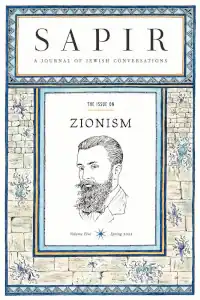SAPIR: A Journal of Jewish Conversations
SAPIR: A Journal of Jewish Conversations, also known as the SAPIR Journal, is a quarterly journal focused on cultural, political, and social issues related to the Jewish community, with a focus on American Jews.[1] The journal consists of invited long-form think-pieces published around a different quarterly theme of interest to the Jewish community.[2]
 | |
| Editor | Bret Stephens |
|---|---|
| Categories | Jewish affairs and identity |
| Frequency | Quarterly |
| Founded | 2021 |
| Company | Maimonides Fund |
| Country | United States |
| Language | English |
| Website | https://www.sapirjournal.org |
| ISSN | 2767-1720 |
SAPIR is published by the Maimonides Fund, and its editor-in-chief is The New York Times columnist Bret Stephens. SAPIR publicly launched in March 2021 and released its first issue in April.[2] SAPIR's launch was amidst a rise between 2021 and 2023 of journals across the ideological spectrum related to the Jewish experience, including by left-leaning T'ruah.[3][4]
On April 1, 2023, the Maimonides Fund launched the SAPIR Institute, an in-house organ to turn the ideas generated by the journal into future plans of action. The institute is led by Chanan Weissman, former White House Jewish Liaison.[5]
See also
References
- "About Us". Sapir Journal. Maimonides Fund.
- Elia-Shalev, Asaf (2021-03-24). "NY Times' Bret Stephens is editing a new Jewish journal, starting with an issue on 'Jews and social justice'". Jewish Telegraphic Agency. Retrieved 30 August 2023.
- Silow-Carroll, Andrew (2023-03-26). "The battle for Jewish hearts and minds returns to the printed page". Jewish Telegraphic Agency. Retrieved 30 August 2023.
- Elia-Shalev, Asaf (2022-09-22). "Progressive Jewish group launches think tank to counter spread of right-wing ideas". The Forward. Retrieved 30 August 2023.
- Ari Gross, Judah (2023-03-15). "Maimonides Fund launches in-house institute to turn Sapir Journal ideas into action plans". eJewishPhilanthrophy. Retrieved 30 August 2023.